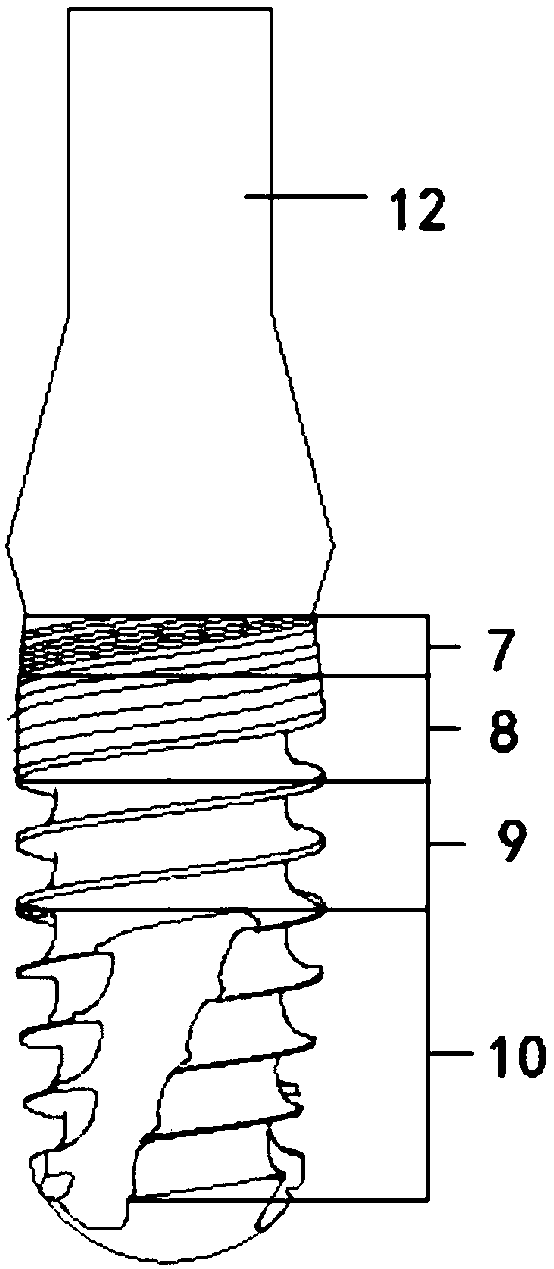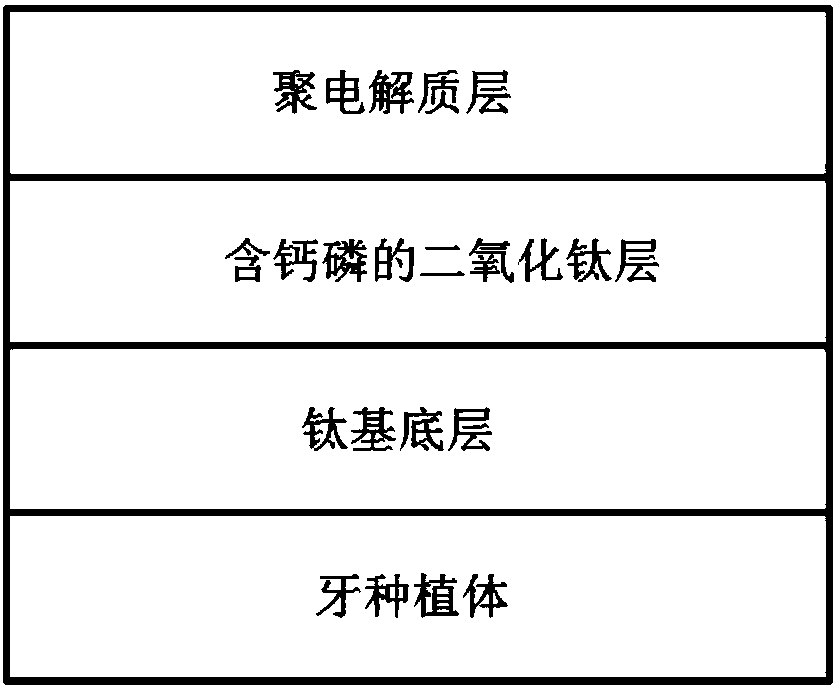Implant with surface active coating
A surface active, implant technology, applied in the direction of surface reaction electrolytic coating, coating, dental implant, etc., can solve problems such as implant failure, achieve the effect of increasing coarseness, uniform physical and chemical properties, and mild preparation conditions
- Summary
- Abstract
- Description
- Claims
- Application Information
AI Technical Summary
Problems solved by technology
Method used
Image
Examples
Embodiment 1
[0053] (1) The surface of the titanium metal implant was polished step by step with 200, 300, 600, 1200 and 2000 mesh sandpaper, followed by ultrasonic cleaning with acetone, ethanol and distilled water for 10 minutes, and the titanium base layer was formed after drying;
[0054] (2) Place the implant in step (1) in a mixed etching agent composed of hydrofluoric acid and hydrochloric acid for surface etching treatment, ultrasonically clean it with distilled water, and then dry it naturally at room temperature; the mixed etching agent is 47% HF The mixed solution mixed with 38% HCl according to the volume ratio of 1:1, the surface etching treatment conditions are: 60°C, 20min;
[0055] (3) In an air environment, add calcium chloride and sodium dihydrogen phosphate to deionized water to obtain a mixed solution, use it as an electrolyte, place the implant in step (2) in the electrolyte, and use titanium metal The anode is used as the anode, and the stainless steel is used as the ...
Embodiment 2
[0061] (1) The surface of the titanium metal implant was polished step by step with 200, 300, 600, 1200 and 2000 mesh sandpaper, followed by ultrasonic cleaning with acetone, ethanol and distilled water for 10 minutes, and the titanium base layer was formed after drying;
[0062] (2) Place the implant in step (1) in a mixed etching agent composed of hydrofluoric acid and hydrochloric acid for surface etching treatment, ultrasonically clean it with distilled water, and then dry it naturally at room temperature; the mixed etching agent is 47% HF The mixed solution mixed with 38% HCl according to the volume ratio of 1:1, the surface etching treatment conditions are: 60°C, 20min;
[0063] (3) In an air environment, add calcium chloride and sodium dihydrogen phosphate to deionized water to obtain a mixed solution, use it as an electrolyte, place the implant in step (2) in the electrolyte, and use titanium metal The anode is used as the cathode, and the stainless steel is used as th...
Embodiment 3
[0069] (1) The surface of the titanium metal implant was polished step by step with 200, 300, 600, 1200 and 2000 mesh sandpaper, followed by ultrasonic cleaning with acetone, ethanol and distilled water for 10 minutes, and the titanium base layer was formed after drying;
[0070] (2) Place the implant in step (1) in a mixed etching agent composed of hydrofluoric acid and hydrochloric acid for surface etching treatment, ultrasonically clean it with distilled water, and then dry it naturally at room temperature; the mixed etching agent is 47% HF The mixed solution mixed with 38% HCl according to the volume ratio of 1:1, the surface etching treatment conditions are: 60°C, 10min;
[0071] (3) In an air environment, add calcium chloride and sodium dihydrogen phosphate to deionized water to obtain a mixed solution, use it as an electrolyte, place the implant in step (2) in the electrolyte, and use titanium metal The anode is used as the cathode, and the stainless steel is used as th...
PUM
 Login to View More
Login to View More Abstract
Description
Claims
Application Information
 Login to View More
Login to View More - R&D
- Intellectual Property
- Life Sciences
- Materials
- Tech Scout
- Unparalleled Data Quality
- Higher Quality Content
- 60% Fewer Hallucinations
Browse by: Latest US Patents, China's latest patents, Technical Efficacy Thesaurus, Application Domain, Technology Topic, Popular Technical Reports.
© 2025 PatSnap. All rights reserved.Legal|Privacy policy|Modern Slavery Act Transparency Statement|Sitemap|About US| Contact US: help@patsnap.com


